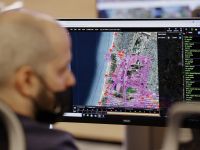Students simulate disease outbreak in Carnegie Mellon’s new biological sciences outreach program

Secondary school students learned how to analyze a simulated disease outbreak during a new interactive outreach program that was developed by Carnegie Mellon. The program aims to engage students through a laboratory experience, teach them lab techniques, and inform them about Carnegie Mellon’s new programs in Biological Sciences and Computational Biology. Twenty-five students from 14 different schools across Qatar participated.
"The Student Biotechnology Explorer Program is part of the university’s recently launched biological sciences undergraduate program. It is designed to ignite a passion for biology among the youth in the community, give students first-hand lab experience while using cutting-edge lab techniques, as well as teach students how their bodies function at a biological level,” said Kenneth Hovis, Ph.D., assistant teaching professor of biology at Carnegie Mellon Qatar.
“Through this program, we hope high school students learn more about the biological sciences undergraduate degree at Carnegie Mellon and meet some of our current students and faculty," Hovis added.
Students who participated in the program used a test called an ELISA (Enzyme-linked immunosorbent assay) to track a simulated disease outbreak as it spread through the community. During the experiment students worked in groups and were able to track the outbreak, determine who was infected and identify the source of the disease.
"With my interest in medicine, the Student Biotechnology Explorer Program was definitely an exciting opportunity for me. We learned a lot and met new people from other schools. The program also gave me a chance to explore Carnegie Mellon’s campus and learn more about the biological sciences degree it offers in Education City.
“I hope that this program continues in the future, as I would be looking forward to be a part of it again," said Basma Fakhroo, a grade 12 student at Qatar International School.
Carnegie Mellon’s two recently-launched undergraduate degree programs in biological sciences and computational biology are a collaborative effort with Weill Cornell Medical College in Qatar, with students receiving their degrees from Carnegie Mellon.
Background Information
Carnegie Mellon University Qatar
For more than a century, Carnegie Mellon University has challenged the curious and passionate to imagine and deliver work that matters. A private, top-ranked and global university, Carnegie Mellon sets its own course with programs that inspire creativity and collaboration.
In 2004, Carnegie Mellon and Qatar Foundation began a partnership to deliver select programs that will contribute to the long-term development of Qatar. Today, Carnegie Mellon Qatar offers undergraduate programs in biological sciences, business administration, computational biology, computer science, and information systems. Nearly 400 students from 38 countries call Carnegie Mellon Qatar home.






